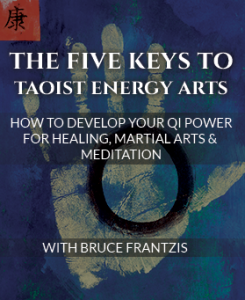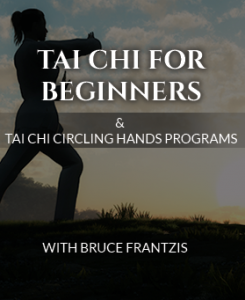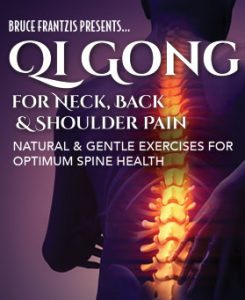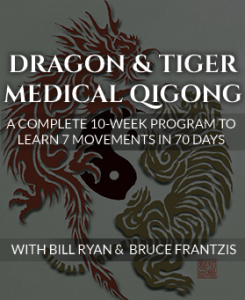As someone who has taught energy arts practices like tai chi and qigong for over 50 years now, one of the most common questions I get asked while teaching (and at retreats) is, “How can I get the most out of my practice?”
I also often get asked more specific questions such as; how long should I practice and how often should I practice. Everyone wants the magic formula.
In this post I want to share with you some of the practice methods I’ve used personally, as well as what I have observed works for those wanting to increase their skill level in the shortest amount of time.
How Long Should I Practice?
This question seems very simple but it’s actually very tricky. There are three complications here. First, its important to understand within Taoist philosophy and the specific Water tradition I teach that, when possible, it is ill advised to tell anyone what they should or should not do.
The Taoist’s believe that it is important that the individual modulate and learn for themselves how much they should practice. It is based on the idea that we are all free individuals and what we choose to do ourselves has much more power because it comes from the inside rather than from some external dogma, source or formula.
When someone asks me this question often my response is, “If you want the best result then do this much training, and if you can’t do that then do this much training.” There is a continuum of effort and results.
This brings us to the second complication, which is that everyone is an individual with different energetic makeups. What may be appropriate for one person to do for 15 minutes may be okay for another to do for 2 hours. Age, body type, experience all factor into the equation. It is important to be honest in the moment about your capacity when making this judgement.
So, this may not be the answer you want to hear, but it really is up to you to monitor how much your body can take and it depends on your personal circumstances. Or, another way of saying this is: Follow the 70% rule.
When I tell people to practice at least two hours a day if they want to really excel, often they get discouraged because it can be a great challenge to do so. It takes a lot of dedication to learn any kind of sport or energy art to a high level of achievement.
The sad fact is most people do nothing day after day, so if you can manage to get 20 or 30 minutes of a qigong or tai chi practice in, your body, mind and spirit are going to be very thankful.
So, do what you can do with the time you have and don’t beat yourself up if you can’t do more. It is really that simple. Something is better than nothing. Taking any small action in a positive direction is better than living in the land of ‘what if’.
The last point to the question is that it’s important that you practice the right things and in the right manner. If you are putting in more hours, but your form is bad, then you would be better to be practicing smaller exercises that help you embody the fundamentals first.
I have said this elsewhere but it often takes 10 times longer to correct a bad habit than it does to create it. When you are learning something for the first time take extra care and when possible get corrections with your local teacher to avoid having to un-wire it in your system later.
How Often Should I Practice?

So, this question of how often should I practice, is really a variation of the first question. But it’s worth talking about because how often you practice really does have an effect on the energetic and nervous systems of your body.
The simple rule is that the more often and the more consistent you can be with your practice the better. It is much better to practice every day than to attempt to do mega-practice sessions because the body’s energy system just cannot digest these longer sessions. For most people, in fact they often have the opposite effect.
It would be like not running for a year and then going out and attempting to do a marathon. Or not eating for five days and then attempting to make up for it in one meal. Catching up is a failure strategy.
A couple of quick guidelines: First, it’s better to be consistent and practice every day for a little while. Second, when you have a string of good practice days together, but your body/mind seems to be getting tired, then take a day off. Let your body rest and reset without mental or emotional judgments.
Just be ready and enthusiastic to get right back in once you have had enough time to recover. On that day off maybe do a few minutes only, or passive practices such as following your breath, watching the flow of your mind and emotions, visualizing yourself doing a practice set, etc… Your body needs time to rest, restore, reset and rejuvenate – even for the strongest individuals.
How Should I Practice During and After A Retreat or Major Teachings?
There is also the special case where you have been on a weekend training, retreat for multiple weeks or even months, like many who were with me this summer. The goal here is to transfer the training you just learned and get it fully integrated into your daily life.
Following this advice is good is not just for Taoist practitioners, but it is also useful for anyone learning any kind of new skill, especially physical ones.
Often, right after a major extended teaching, there is a tendency to want to take a break. You may have worked really hard. You want to rest. You may have to travel back into day-to-day busy reality, and you may not immediately be able to find the time to practice. This is obviously NOT the ideal strategy.
The best case scenario is immediately you do the opposite. After the retreat, I recommend that you practice what you have learned continuously for at least three weeks to a month. You want to stabilize what you just learned. You want to maximize the investment that you just spent and be sure that it stays with you. You want to get your body to remember it so it sticks.
You should do this unless you have some very special extenuating circumstances.
Why is this?
Practicing every day will allow what you have learned to become stable. The seed will be preserved because you have given it a good start. If you don’t spend the three weeks the seed may be compromised or never grow.
More advanced teachers (at trainings) use energetic transmissions. This is the case in Taoism and also in schools of Buddhism. These transmissions are the energetic code that are transferred to you during the longer retreats . . . but they have a shelf-life and must be activated.
The more you practice immediately after the retreat the more of a chance you have for what you learned to really sink in. You rewire your system and the transmissions can have the highest potential to help you and your body.
So immediately after a retreat where you have learned a lot, practice every day for up to a month. Better that you do even one set of qigong or tai chi of what you learned than nothing. This will help the training/retreat go from just something that was nice entertainment to something that will actually help your body and your life. Of course, if your body needs a break take it. But if you can, then keep doing 2-3 full practice sets daily of what you have just learned.
Once the energetic transmissions, the physical movements and everything you just learned grounds in your body, there is less chance that you will have to relearn it later even if you have to take some time off, as long as you have taken the time to integrate the experience of the extended training.
Learning to develop your own daily practice and commit can really transform your body and your nervous system. Following this “secret” of traditional cultivation you grow your chi (qi) and build your energy reserves daily.
This is one of the great gifts that Taoism and arts like qigong and tai chi have to give the world and the West. Good luck practicing and I hope this was useful to you!









Qigong
Hi Bruce,
Thank you very much for your insights. Later this month Steve Barowsky will be coming to Squamish , BC Canada to teach energy gates qigong. This will be the first time a senior EA instructor will be coming to Canada. Then in October Aaron Green is coming to Kimberley BC. I’ve been waiting over 5 years to see an EA teacher so Im really looking forward to these events. I will Definetly apply your advice after this training is done.
Many thanks for all you do and I look forward to training you sometime soon!
Kevin Hartwell
This guy has earned support
This guy has earned support from the Uk.
Again, a very informative and
Again, a very informative and useful information (at lesst for me). I have been enjoying this kind of knowledge-transfer for a longer time.
Thanks for sharing it !
Alex
train & rest
Thank you for this post. I find it very relieving to know that there are days for training and days for rest. Or at least days for physical training and days for meditation.
And it would be really helpful to know: how do I know if I train RIGHT?
How much to practice Tai Chi
How much to practice Tai Chi
The Price of Practice is High But So Are the Rewards
Great post Bruce! I purchased your Taoist Meditation : Water Tradition CD set and found it very helpful. I also gave it to my father for a Christmas gift because we all need to learn to let go.
I definitely agree with practicing as much as you can given your ability to recover from the training. Too often we set guidelines in stone and end up exceeding our own abilities… of course the opposite is also true… in that we may not be practicing enough.
Keep up the good work
Brandon
Bagua Mastery Program- Awesome
Bruce- thanks for this- I’m excited to be part of your online Bagua Mastery course. In the past I’ve had a tendency to just blow through stuff and it’s refreshing to slow down and take time with this deep material. There is a ton of wisdom here, I’ve been spending about an hour a day to go through it carefully piece by piece. I hope to do a live event maybe in 2018, that will be fantastic.
Tai Chi Practice
Your article on practice was terrific! The advice was spot on as far as I’m concerned. My problem is I forget if I don’t practice regularly (and I do practice daily). The difficulty is trying to practice everything regularly enough that some of it doesn’t disappear.
Your articles are always interesting and full of good advice. Keep ’em coming.
Thank you,
Joe Nowak